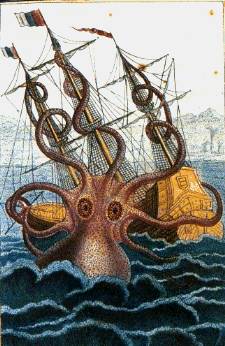Squids!
 It's been a while I know. The three of you who read these posts will be happy to know, however, that I've been busy on the work front and come up with a few extra bits and pieces for the Guardian's science podcast. That, by the way, is going from strength to strength. We have a new myspace page so please become our friend and leave us some lovely comments.
It's been a while I know. The three of you who read these posts will be happy to know, however, that I've been busy on the work front and come up with a few extra bits and pieces for the Guardian's science podcast. That, by the way, is going from strength to strength. We have a new myspace page so please become our friend and leave us some lovely comments.
On the articles front, here's something I did for the paper at the weekend on people's fascination for monsters of the deep. The article in the paper is a shortened version of the piece below, spurred on by the discovery of a Colossal squid in the Ross Sea by New Zealand fisherman.
Before Google Earth come along, cartographers would often write three words on the edge of their maps, a shorthand for the mysteries that people were convinced lay beyond the edge of the known world: here be monsters. Fuelled by tall tales of mermen and sea serpents recounted by generations of world-weary sailors, the oceans of the world became a repository for legions of terrifying creatures.As sea monsters go, the Kraken is king. The size of a floating island, legend has it that the squid-like creature could cripple warships with its immense tentacles, dragging unlucky sailors into whirlpools and on to the dark of the ocean below. As Alfred Tennyson put it: "Far far beneath in the abysmal sea/His ancient, dreamless, uninvaded sleep/the Kraken sleepeth”.
Fishermen found a real-life Kraken last month in the Ross Sea, off the coast of Antarctica. The largest ever Colossal squid ever seen, the 450kg monster was hauled off to Te Papa Museum in New Zealand. Though scientists are only beginning to study the animal - their immediate problem seems to be how to defrost the animal without damaging it - there is already little doubt that it will provide a remarkable insight into life in the cold southern oceans.
The fascination with big squid-like creatures, the real-life monsters of the deep, is nothing new. When Pierre Aronnax, the marine biologist on the Nautilus in Jules Verne’s 20,000 Leagues Under The Sea, sees giant squid hovering next to the submarine, he describes “a horrible monster worthy to figure in the legends of the marvellous. It was an immense cuttlefish, being eight yards long. It swam crossways in the direction of the Nautilus with great speed, watching us with its enormous staring green eyes...The monster’s mouth, a horned beak like a parrot’s, opened and shut vertically. Its tongue, a horned substance, furnished with several rows of pointed teeth, came out quivering from this veritable pair of shears. What a freak of nature, a bird’s beak on a mollusc!”
A gargantuan Kraken also made a guest appearance in last summer’s blockbuster, Pirates of the Caribbean: Dead Man’s Chest, dragging Jack Sparrow underwater as the credits rolled.
In the real world, only a handful of big squids are found every year, usually half-digested in the stomachs of sperm whales, or dead or dying near the surface of the ocean. No-one has much idea where they live, what they eat, how they move or how they reproduce. Almost everything written in books about the behaviour of these animals is educated guesswork.
When a group of squids attack the Nautilus, Captain Nemo is left holding back tears at the loss of a crewmate. In reality, giant squid are less diabolical: a large specimen might eat 50kg of food every day but probably does it by hovering quietly in the water, waiting for some unsuspecting smaller squid or large fishes hove into view. The Kraken described by Tennyson had more in common with the Colossal squid, which is thought to be a more aggressive predator that roams at depths of 2,000m. But so far, even they haven’t pulled any ships into whirlpools, sailors and all.
Whatever fear there is of these unremitting terrors that lie deep in the ocean, it’s worth talking comfort from something hinted at by Tennyson and which has been proved right time and again - the monsters of the deep probably aren’t meant to meet people. Most, like his Kraken, come to a withering end if they stray out of their comfort zones in the deep ocean. “In roaring he shall rise and on the surface die.”
Read More...

